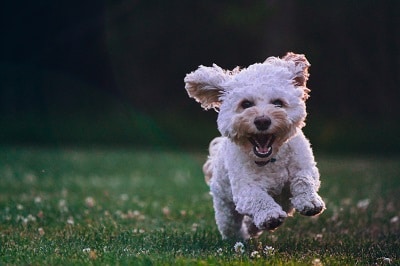For those of us who have ever owned a puppy, we will have noticed that they have a distinct and somewhat pleasant breath which is nothing like the breath they inevitably have when they’re adults. It’s gentle, a little bit sweet and not nasty at all. In fact, it’s pleasant enough that it’s enjoyable to be licked by a pup.
But why do puppies possess such a pleasant breath and why does it go away when they become older?
What is puppy breath and why do they have it?

To put it simply, puppy breath is the absence of bacteria, oral disease and trapped food. While they’re still on mother’s milk and with young milk teeth, their mouth is pretty much spotless and free of the nasty stuff that creates bad breath in the first place.
During the first few weeks of life, pups don’t have any teeth which means an absence of plaque, tartar and bacteria in the gums. As they progress and their milk teeth come through and still on their mother’s milk which can create a pleasantly sweet smell. There’s no bad stuff in canine milk which could cause bad smells. Breastfed human babies go through the same where they’re breath is also rather sweet before they start being weaned and on to solid food.
Every pup is different, of course, and may not have the sweet smell, to begin with – it really does depend on their diet and how clean they can keep their mouths.
How long does puppy breath last for?
The length of time puppy breath lasts varies from pup to pup but generally, puppy breath gradually disappears from 8 weeks when they start to be weaned off their mother and especially when their proper set of teeth come in and they start attracting bacteria, plaque and tartar.
Is it bad when puppies lose puppy breath?
It’s completely normal for puppies to lose that lovely puppy breath, in fact, we would go as far as say it’s inevitable. It’s not a bad thing to lose but it is a bad thing if you would consider your dog’s breath to be foul and unbearable. This is a potential symptom of an underlying oral or digestive problem.
How to extend puppy breath
Practising good oral hygiene is the best way to extend your puppies puppy breath. Investing in a dog toothbrush and toothpaste early will not only keep their pearly whites the same but it will help them get used to the event and you’ll be able to keep brushing them well into adulthood. Secondly, a good puppy toy to dislodge food and keep the saliva flowing will make a lot of difference especially as food is the main cause of dental problems and saliva protects from cavities and keeps gum disease at bay.
Your choice of puppy food plays a big part with brands that offer a complete meal with plenty of vegetables and perhaps some herbs thrown in a better choice for fresh breath than cheap rubbish full of meat and not much else.
Lastly, dental chews are an ideal treat to give them from time to time as they are specifically designed to encourage oral hygiene in a way that they enjoy. It can be a tad expensive so use them sparingly alongside regular brushing and their favourite puppy toy.
Conclusion
Puppies have puppy breath because they do not have oral hygiene problems older dogs have due to the absence of teeth and a gentler diet. The smell of mother’s milk also plays a part. They can’t have puppy breath forever but with a good diet, regular brushing and plenty of chances to clean their own teeth with toys and dental chews you can extend it much longer.
Related Articles




